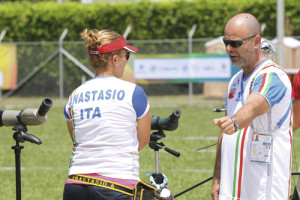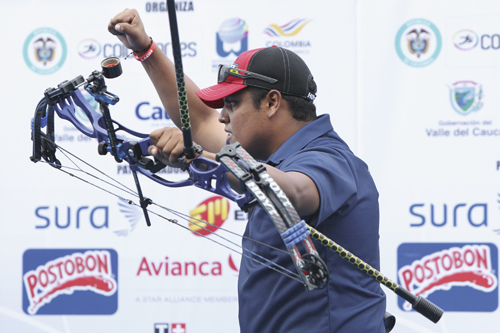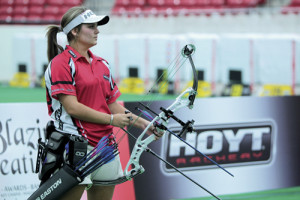Alistair Whittingham looks into what the pressure to achieve can do to an archer’s psyche
Jaded and undirected, a world-class archer once told me that they ‘would rather go on holiday, using up their annual leave from work, than push to compete for their country.’ This comment may seem to be the ultimate in self-indulgence to those who aspire to greatness in archery, and for those who have achieved this level there will be a chill running down their spine as they wonder if I am quoting them.
There is no reduction in pride in representing one’s country for all international archers, but the move towards national federations interfering and meddling without offering support, be it financial or emotional, has led to many of the world’s top athletes becoming disillusioned.
This jadedness can be seen in archers of all levels when they fail to define their objectives, take responsibility for their training, and have a plan that they have helped design and believe in.
If you want to succeed, you had better have a clear idea of what you want to succeed at, and when you achieve this take the time to appreciate what you have done.

Top-level athletes often have goals set by their coach, but archer involvement is essential to avoid disillusionment
You must select, and set, challenges that matter to you, or in the case of international athletes, be suitably recompensed for taking on challenges set by others. In order to decide what you are willing to commit to, you cannot be given goals that you don’t buy into by others.
If people do not respect you for choosing the route that will further your happiness, understanding and ability within your sport, then you must have the courage of your convictions to ignore them. This can often be difficult, or impossible, especially for the funded athlete as they have taken the ‘devil’s money’ and must dance to the banker’s tune.
Who are the, often self-appointed, loud-mouthed ‘purveyors of good taste’ who say that one endeavour is worth more than another at a non-funded level? It is these individuals who decide whether one competition has more value to the archer than another, often with no understanding of how that individual is developing, and so it is up to the archer to decide on the road map to their intended goal. If you don’t want to be part of the squad system, this ‘arranged marriage’, then you will have to do some thinking for yourself and be an effective planner.
You must begin by deciding what you want to achieve, and this should be based on both realism and aspiration. Somewhere between winning the local club shoot and becoming the next world champion will be your spot on the continuum, and your ability to achieve this will be based on your own resources as well as the outside resources available to you, allied with belief in your ability to complete the stated task. An archer must, wisely, pick an outcome that challenges them and gives the greatest return for their effort, and often money.
An excellent coach once told me that he tried to help the athlete write a personalised ‘treasure map’ to their goal, where he acted as nothing more than guide when needed. This is the perfect level of interaction between coach and athlete, keeping the coach honest and giving the athlete perspective. If you do not have access to a coach to help you then you must have a mentor of some kind in order to keep perspective. If you have no other option, this can be in the form of a training diary where you check how far along the ‘treasure map’ you have got, rather than having somebody else worry about your progress. It has been stated that an archer doesn’t need a coach to achieve the very highest level, but I would point out that not having a coach or mentor uses up your resources more than having one, and so can be inefficient. Similarly, athletes lack perspective; it is part of the ‘artistic’ mindset and they do need to be kept in line by people they respect, who they see as having their best interests in mind.
Whatever level you compete at, the only way that you can improve is by setting realistic and attainable goals that have meaning to you, as those imposed upon someone by an outside agent have no value, and will actually lead to a reduction in motivation and application. Having selected your desired outcome, design some measures to say how you are going to get from where you are at the moment to where you want to be. It is likely that you will have to employ some outside assistance to achieve this, so factor aspects of cost and effort into the overall map.
Now, as this journey is too long to undertake in one go, you must design some waypoints to tell you that you are still on track. These points on the way to your overall goal should have a time aspect, such as when you expect to reach them, and be distinct events that allow you to measure your progress. Time spent and numbers of arrows shot do not equate to progress, so pick measurable points along your journey’s way, and even add in how you would deal with a setback such as not meeting a target waypoint. This breaking down of the overall journey into smaller chunks makes it manageable as well as measurable, so the less daunting it is, the more likely the archer will believe it is possible.
The following mantra is not mine, and I have altered it slightly to remove some of its original religious overtones, but every person, athlete or otherwise, setting out on journey to achieve a goal would do well to remember it:
“Give me grace to accept with serenity the things that cannot be changed, Courage to change the things which should be changed, and the wisdom to distinguish the one from the other. Living one day at a time, enjoying one moment at a time, accepting hardship as a pathway to peace.”
If you have aspirations of any sort to achieve a higher level in your archery, it is important that you understand clearly what it will take to get there, whether that is at club or international level. There will be many aspects to the plan and it is important that the plan is one you believe in and can commit to, while understanding that there will be aspects that are not in your control or that may not be particularly pleasant. Weigh up the options, and if it is worthwhile then commit totally to it, as nothing can be achieved if you hold back, but I implore you to be realistic while you dream.



